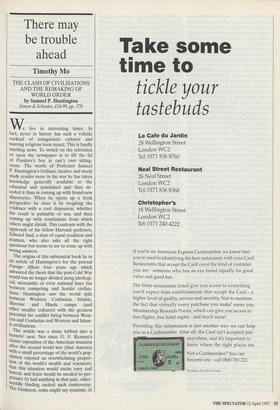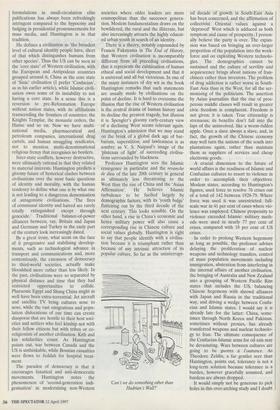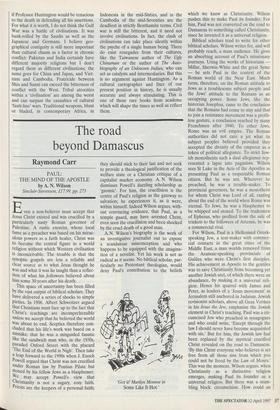There may be trouble ahead
Timothy Mo
THE CLASH OF CIVILISATIONS AND THE REMAKING OF WORLD ORDER by Samuel P. Huntington Simon & Schuster, £16.99, pp. 370 We live in interesting times. In fact, never in history has such a volatile cocktail of antagonistic cultures and warring religions been mixed. This is hardly startling news. To switch on the television or open the newspaper is to lift the lid of Pandora's box in one's own sitting-. room. The worth of Professor Samuel P. Huntington's brilliant, incisive and steely Study resides more in the way he has taken knowledge generally available to the educated and systemised and then de- coded it than in coming up with brand-new discoveries. When he opens up a fresh perspective he does it by weighing the evidence with a cool dispassion, whether the result is palatable or not, and then coming up with conclusions from which others might shrink. This contrasts with the approach of his fellow Harvard professor, Edward Said, a man of equal erudition and acumen, who also asks all the right questions but seems to me to come up with wrong answers.
The origins of this substantial book lie in an article of Huntington's for the journal Foreign Affairs four years ago which advanced the thesis that the post-Cold War world was no longer divided along ideologi- cal, mercantile or even national lines but between competing and hostile civilisa- tions. Huntington saw the world split between Western, Confucian, Islamic, Slavonic and Hindu camps (and Other smaller cultures) with the greatest Potential for conflict being between West- ern and Confucian and Western and Islam- ic civilisations.
The article was a stone lobbed into a hornets' nest. Not since G. F. Kennan's Classic exposition of the American situation after the second world war (that America With a small percentage of the world's pop- ulation enjoyed an overwhelming propor- tion of the world's wealth and resources, that this situation would excite envy and hatred, and force would be needed to per- petuate it) had anything in that pale, other- worldly binding excited such controversy. The frankness, some might say cynicism, of formulations in small-circulation elite publications has always been refreshingly astringent compared to the hypocrisy and fudging in presidential pronouncements for mass media, and Huntington is in that tradition.
He defines a civilisation as 'the broadest level of cultural identity people have, short of that which distinguishes humans from other species'. Thus the US can be seen as the `core state' of Western civilisation, with the European and Antipodean countries grouped around it, China as the core state of `Sinic' civilisation (I prefer 'Confucian', as in his earlier article), while Islamic civili- sation owes some of its instability to not having a core state. In a sense this is a reversion to pre-Reformation Europe without nation states, with its affiliations transcending the frontiers of countries: the Knights Templar, the monastic orders, the Hanse and so on. Now we have multi- national media, pharmaceutical and petroleum companies, international drug cartels, and human smuggling syndicates, not to mention multi-denominational religious frenzy that recognises no borders.
Inter-state conflicts, however destructive, were ultimately rational in that they related to material interests. Huntington predicts a gloomy future of hysterical clashes between civilisations over the most basic questions of identity and morality, with the human tendency to define what one is by what one is not leading to a dangerous demonisation of antagonistic civilisations. `The fires of communal identity and hatred are rarely totally extinguished except through genocide.' Traditional balance-of-power alliances between, say, Britain and Japan and Germany and Turkey in the early part of the century look increasingly dated.
By a great irony, what seem on the face of it progressive and stabilising develop- ments, such as technological advance in transport and communications and, more contentiously, the extension of democracy to third-world societies, actually make bloodshed more rather than less likely. In the past, civilisations were so separated by physical distance and time that they had restricted opportunities to collide. Pharaonic Egypt and Shang China might as well have been extra-terrestrial. Jet aircraft and satellite TV bring cultures nose to nose, while the vast emigrations and popu- lation dislocations of our time can create diasporas that are hostile to their host soci- eties and settlers who feel kinship not with their fellow citizens but with tribes or co- religionists of another civilisation. Kith and kin solidarities count. As Huntington points out, war between Canada and the US is unthinkable, while Bosnian casualties were flown to Jeddah for hospital treat- ment.
The paradox of democracy is that it encourages fanatical and anti-democratic movements. Huntington notes the phenomenon of 'second-generation indi- genisation' in modernising non-Western societies where older leaders are more cosmopolitan than the successor genera- tion. Moslem fundamentalism draws on the bewildered, the rural and the illiterate, but also increasingly attracts the highly educat- ed urban youth in search of an identity.
There is a theory, notably expounded by Francis Fukuyama in The End of History, that Western civilisation is incomparably different from all preceding civilisations, that it represents the culmination of human ethical and social development and that it is universal and all but victorious. In one of the many instances of dry wit in the book Huntington remarks that such statements are usually made by civilisations on the point of decline. It is hard to overcome the illusion that the rise of Western civilisation is the central drama of human history and its decline the greatest tragedy, but illusion it is. Spengler's gloomy early-century view of a declining West seems relevant again. Huntington's admission that we may stand on the brink of a global dark age of bar- barism, superstition, and lawlessness is as sombre as V. S. Naipaul's image of the 'plateaux of light' of succeeding civilisa- tions surrounded by blackness.
Professor Huntington sees the Islamic resurgence in particular and the revanche de dieu of the late 20th century in general as ultimately less threatening to the West than the rise of China and the 'Asian Affirmation'. He believes Islamic turbulence to be fuelled largely by demographic factors, with its 'youth bulge' flattening out by the third decade of the next century. This looks sensible. On the other hand, a rise in China's economic and hence military power will also cause a corresponding rise in Chinese culture and social values globally. Huntington is right to say that people identify with a civilisa- tion because it is triumphant rather than because of any intrinsic attraction of its popular culture. So far as the uninterrupt- 'Can't we do something other than Hadrian's Wall?' ed decade of growth in South-East Asia has been concerned, and the affirmation of collectivist Oriental values against a 'depraved' West which is adduced as both symptom and cause of prosperity, I person- ally believe the party is over. The expan- sion was based on bringing an ever-larger proportion of the population into the work- force and on exploiting Western technolo- gies. The demographics cannot be sustained and the culture of servility and acquiescence brings about nations of fran- chisees rather than inventors. The problem of drug addiction is rather worse in South- East Asia than in the West, for all the ser- monising of the politicians. The assertion by Asian journalists that the rise of pros- perous middle classes will result in greater civic freedom is complacent. Freedom is not given; it is taken. True citizenship is strenuous; its benefits don't fall into the laps of the uninvolved, like a worm-ridden apple. Once a slave always a slave, and, in fact, the growth of the Chinese economy may well turn the nations of the south into plantations again, rather than maintain them as suppliers of services and cheap electronic goods.
A crucial dimension to the future of world affairs is the readiness of Islamic and Confucian cultures to resort to violence in order to accomplish their objectives. Moslem states, according to Huntington's figures, used force to resolve 76 crises out of a total of 142 between 1928-79. Where force was used it was unrestricted: full- scale war in 41 per cent of cases where vio- lence was employed. Chinese propensity to violence exceeded Islamic: military meth- ods were used in nearly 77 per cent of crises, compared with 18 per cent of US crises.
In order to prolong Western hegemony as long as possible, the professor advises delaying the proliferation of nuclear weapons and technology transfers, control of mass population movements including immigration, abstention from interfering in the internal affairs of another civilisation, the bringing of Australia and New Zealand into a grouping of Western Pacific Rim states that includes the US, balancing Chinese hegemony with shrewd alliances with Japan and Russia in the traditional way, and driving a wedge between Confu- cian and Islamic states. I would say it is already late for the latter: China, some- times through North Korea and Pakistan, sometimes without proxies, has already transferred weapons and nuclear technolo- gy to Iran. The ultimate consequence of the Confucian-Islamic arms for oil axis may be devastating. Wars between cultures are going to be guerres a l'outrance. As Theodore Zeldin, a far gentler seer than Huntington, points out, tolerance is not a long-term solution because tolerance is a burden, however gracefully assumed, and burdens are always dropped.
It would simply not be generous to pick holes in this over-arching study and I doubt if Professor Huntington would be tenacious to the death in defending all his assertions. For what it is worth, I do not think the Gulf War was a battle of civilisations. It was bank-rolled by the Saudis as well as the Japanese and Germans. I believe geo- graphical contiguity is still more important than cultural chasm as a factor in chronic conflict: Pakistan and India certainly have different majority religions but I don't regard them as different civilisations; the same goes for China and Japan, and Viet- nam and Cambodia. Fratricide between Shia and Sunni can exceed the bitterness of conflict with the West. Tribal atrocities within a 'civilisation' are among the worst and can surpass the casualties of cultural 'fault-line' wars. Traditional weapons, blunt or bladed, in contemporary Africa, in Indonesia in the mid-Sixties, and in the Cambodia of the mid-Seventies are the deadliest in strictly Benthamite terms. Civil war is still the bitterest, and it need not involve civilisations. In fact, the clash of civilisations can take place silently within the psyche of a single human being. There do exist renegades from their cultures, like the Taiwanese author of The Ugly Chinaman or the author of The Auto- biography of an Unknown Indian, who can act as catalysts and intermediaries. But this is no argument against Huntington. As a cultural cartographer and fixer of our present position in history, he is usually accurate and always stimulating. This is one of those rare books from academe which will shape the times as well as reflect them.




































































 Previous page
Previous page